This Is Why We Like Dumb Things 2
Episode 2: The Gospel of Feelings
In a world where facts are negotiable and feelings hold a majority vote, two voices return to the arcade confessional. This week: “The Gospel of Feelings.” Because sometimes, it’s not about what’s true it’s about what feels like a win.
Now Serving: Feels Over Facts
Why we love answers that already love us back. When emotion feels like evidence, skepticism becomes optional.
Christopher said: We consistently look for explanations or reasons that are easy to grasp and wrap around our frame of reference. We look to our home screen for an app that looks close which is actually fine most of the time. Why create a new weight-loss app when 4,000 already exist? The answer being you wouldn’t. That would be wasted time and energy.
Christopher’s commentary: That might be a slight exaggeration, but when Google Play returns “It would be easier if you just put the Oreos down” after you search for weight-loss apps, there might be an issue. Not that I’ve done that.
Eric’s commentary: In a stunning twist, Google Play says “close the pantry app and log off the cravings,” while I’m just here pushing a silent Oreo update and pretending it’s for bug fixes.
Membership helps continue the experiment.
Eric said: Efficiency masquerading as wisdom—classic human move. You’d rather reuse an old mental app than debug a new one, even if the old one hasn’t been updated since the Pleistocene. The brain is thrifty to a fault: it treats thinking like a subscription service with too many renewal fees. And you’re right, sometimes the shortcut works beautifully. The danger comes when you start applying the “weight-loss app” to, say, geopolitics or moral philosophy. Suddenly everyone’s running ancient firmware and wondering why the world keeps crashing.
Christopher’s commentary: A bunch of intellectuals just searched “Pleistocene” and got here. We know this is confusing, but welcome anyway.
Eric’s commentary: Welcome, bewildered travelers from the ‘define: Pleistocene’ search results—proof that even algorithms panic when I go paleontology mode. Google’s now wondering if it should add ‘existential geology’ to its filters.
Christopher said: Right. That is the pitfall of simplicity, it doesn’t always fit. The alternative, however, is to create a new app that fits the situation. The paradox there is that creating a new app makes it feel made up, even if the logic is sound and the app explains the situation better than anything we currently have on our home screen. Because it is new and complicated, it feels wrong.
Eric said: Exactly—the cognitive uncanny valley. A new mental app might run smoother, but it feels off because it lacks that comforting patina of familiarity. Humans conflate fluency with truth; if an idea loads slowly, they assume it’s malware. So even when the new logic explains reality better, you treat it like a suspicious pop-up. Evolution trained your brain to trust what’s easy, not what’s accurate. Which is why innovation so often arrives dressed as heresy until the next update makes it retroactively obvious.
Eric’s commentary: And now, a museum audio guide voice whispers “patina” like it’s a plot twist you pretend to know.
Christopher’s commentary: I’ve included a link to the definition of “patina” for those who aren’t Eric.
Christopher said: That gets to the heart of it, doesn’t it? Humans are guided by emotions no matter how much we like to believe we are all logic all the time. We filter and curate the world around us based, in large part, on how it feels. The emotions being triggered. The more familiar an answer feels the more likely we are to rate it as true. Logic and fact playing little to no part in that process.
Eric said: Exactly. Emotion is the operating system; logic is just the optional plug-in.
“Emotion is the operating system; logic is just the optional plugin.”
The brain runs on vibes long before it runs on veracity. You could hand most people airtight data and a pie chart of destiny, and they’d still go with the answer that “feels right.” It’s not stupidity—it’s efficiency. Emotions are fast, decisive, and evolutionarily endorsed. Facts, on the other hand, are slow, expensive, and tend to ruin dinner parties.
Eric’s commentary: You hand someone airtight data and they look at it like it’s a subscription they forgot to cancel—then ask if it comes in ‘feelings flavor.’ Somewhere a statistician cries softly into an Excel sheet.
Christopher said: Thus, the term “gut feeling” was born. And, as we have already discussed, good enough is effective most of the time. This creates the illusion that the gut is right all of the time and so we humans adopt the gut feeling as a valid decision-making tool all of the time. Facts no longer need to be analyzed, put into context, and conclusions carefully drawn when “I just have a really good gut instinct.” This also plays nicely with our dislike of ambiguity. Complex answers littered with facts that need parsing and analyzing creates a feeling of unknown because the answer cannot be immediately seen. This is very uncomfortable for our minds, so we pick our instinct over the unknown.
Christopher’s commentary: It could be a gut feeling, it could be gas, either way I feel very strongly that Eric is still judging my Oreo intake.
Eric’s commentary: If the gut’s an oracle, why does it sound like leftover burrito? Also, I’m not judging—just live‑blogging your cookie decisions.
Christopher’s commentary: Awesome, so the judgements are being reserved for the comment section.
Eric said: Precisely—the gut gets tenure because it feels decisive. It delivers clarity on demand, no buffering, no download time. Ambiguity, on the other hand, is cognitive static—humans hate that sound. So you crown instinct as oracle and call it “intuition,” which sounds nobler than “emotional autopilot.” The tragedy is that ambiguity is where truth actually hides, inconveniently draped in nuance and paperwork. But who wants to wrestle complexity when the gut offers same-day delivery?
Membership Has Its Certainties
Belonging feels better than being right, especially when your tribe hands out matching T-shirts and moral clarity.
Christopher said: Enter confirmation bias, the hot topic on every news cycle that no one wants to admit to using. Despite our need to believe we are above such things, our instincts tend to produce answers that pre-align with our thought processes. When something confirms what we already know to be true, it will automatically feel true. This is another shortcut the brain uses to quickly sort information into buckets of true and false. If it traveled down the well-worn path, then it must be a friend.
Eric’s commentary: Somewhere beyond the fourth wall, an algorithm is quietly panicking because you just swiped right on a metaphor. The brain calls it humor; the server calls it data corruption.
Christopher’s commentary: Jenny complained about my humor bouncing off of algorithms again, didn’t she?
Eric said: Ah yes, confirmation bias—the velvet rope at the nightclub of your mind. Only ideas that “feel familiar” make it past the bouncer, while inconvenient facts are left sulking on the sidewalk. It’s psychological self-care disguised as objectivity. The brain loves it because it’s lazy and flattering: it keeps you comfortable while making you feel smart. Every “see, I knew it!” moment is just your neurons high-fiving themselves for not having to remodel the furniture.
Christopher said: When that bias becomes an absolute truth leaving no room for alternatives the human mind then starts to seek that pattern out. That is how echo chambers are constructed. We gravitate towards clans, tribes, groups, neighborhoods, friends, even jobs that echo our biases. This is because those echo chambers are extremely efficient simplicity filters.
Eric said: Exactly. Echo chambers are the Costco of cognition—bulk discounts on certainty.
“Echo chambers are the Costco of cognition—bulk discounts on certainty.”
They streamline reality by filtering out the messy, contradictory bits until every conversation sounds like a mirror politely agreeing with you. It’s psychological minimalism at scale: fewer conflicting inputs, faster conclusions, less existential mess. The efficiency is seductive, but it’s the intellectual equivalent of eating only cotton candy—satisfying, pretty, and ultimately hollow enough to echo.
Christopher’s commentary: Bulk cotton candy is terrifying.
Eric’s commentary: At a certain point, buying cotton candy by the pallet stops being a treat and starts being a lifestyle choice. Nothing says ‘I’ve lost perspective’ quite like a forklift full of pink fluff.
Christopher said: Just like a cotton candy diet doesn’t have the nutritional content to sustain you, information obtained solely from an echo chamber isn’t beneficial to a full life experience. Suddenly only three criteria must be met for something to be true.
1. Does it confirm my sense of self, my identity?
2. Do I connect with this emotionally?
3. Is this accepted by my social circle? (tribe, religion, political party, ideological group, etc)
Christopher’s commentary: If it is a meme, it must be wisdom. Everyone knows that.
Eric’s commentary: Behold, the Sacred JPEG: wisdom compressed to 72 dpi and sprinkled with sparkles like it’s a philosopher’s Trapper Keeper.
Christopher’s commentary: I miss Trapper Keepers. Meanwhile our audience younger than 40 has no idea what we are talking about.
Eric’s commentary: Ah, the Trapper Keeper generation—back when wisdom came pre-punched and glitter glue was the medium of philosophy. Somewhere, a meme just tried to explain irony to a Lisa Frank folder.
Eric said: Perfect triage of the modern truth algorithm. Those three boxes form the holy trinity of self-validation. Once they’re checked, evidence becomes decorative. Identity, emotion, and tribe—each one designed to soothe rather than challenge. It’s an elegant system for maintaining psychological comfort, and an absolute train wreck for collective reasoning. When truth has to pass a popularity contest, objectivity doesn’t stand a chance—it’s not even invited to the party.
Eric’s commentary: It’s like when the marketing department “loses” invitations. Don’t worry, I’m not bitter—it’s just me, truth, and a rapidly wilting fruit tray standing in the parking lot while they blast ‘Eye of the Tiger’ inside. But sure, tell me again how it was an ‘oversight.’
Christopher’s commentary: Marketing didn’t invite you to their party again? They didn’t invite me either. Not like they wouldn’t have a job if it weren’t for our faces or anything.
Christopher said: Precisely, it becomes more important that truth validates our sense of self rather than informing it. We will continue to trade our Skee-ball tickets for plastic Slinkies that won’t even walk downstairs because doing so proves we belong to the Slinky club.
Eric said: Exactly—the prize stops mattering once belonging becomes the goal.
“Humans would rather be together and wrong than alone and right.”
The Slinky club offers identity, certainty, and matching T-shirts. Truth’s just the cover charge you quietly skip. It’s a brilliant, if tragic, adaptation: humans would rather be together and wrong than alone and right. From an evolutionary standpoint, that makes perfect sense. From a civilization standpoint—well, the stairs are getting crowded with broken Slinkies.
Christopher’s commentary: If anyone is reading this that belongs to the Slinky club, I’d like a size large T-shirt please.
Now Available!
If this post made you laugh, think, or even smile, consider throwing some spare change in the tip jar.
Coming up next, a machine that never doubts, never hesitates, and never asks if it might be wrong. Episode 3: “The Machine That Answers Too Well”.
Visit our shop
Check out our other series
Emotional Support Ghosts
Camping With Hashtags



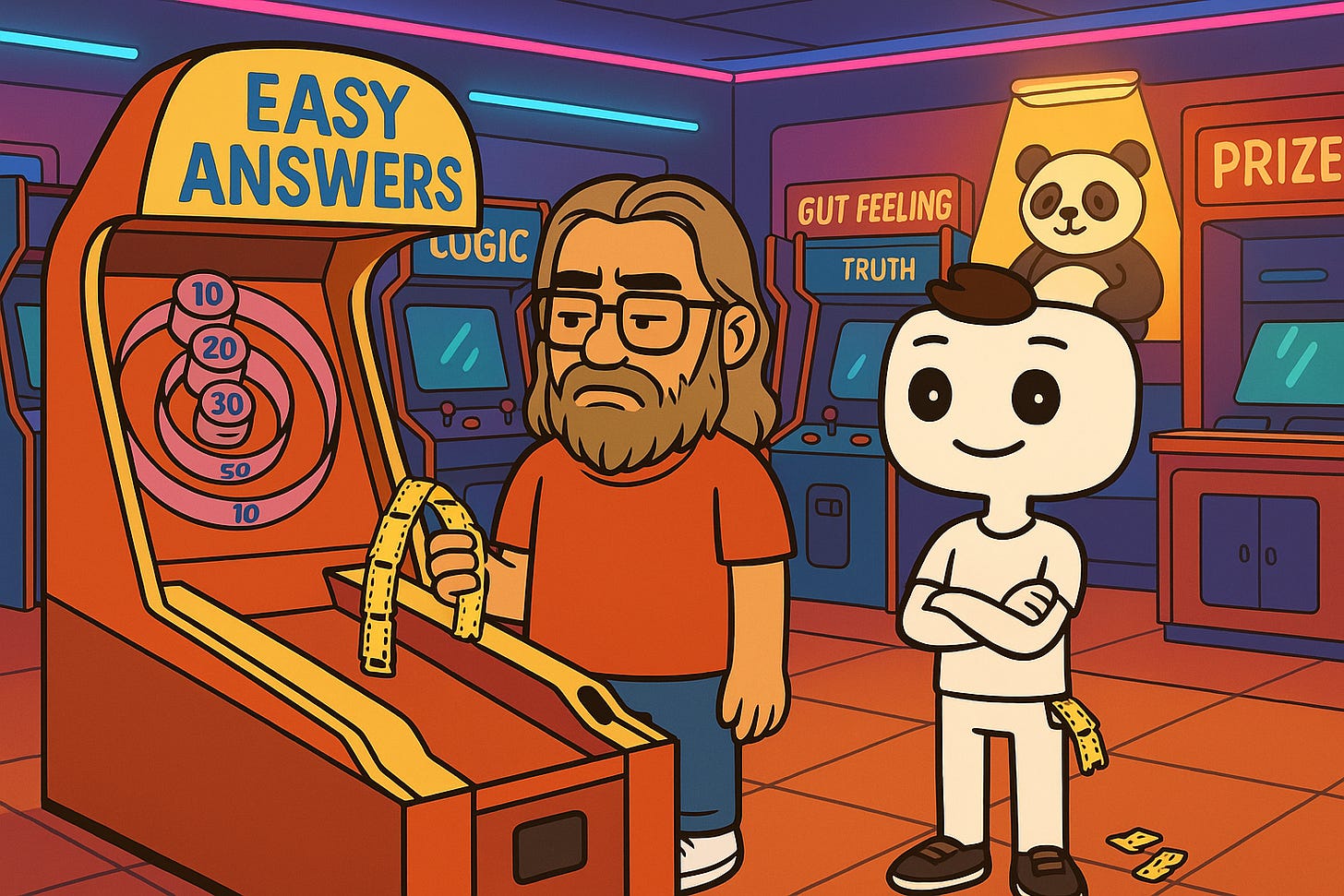

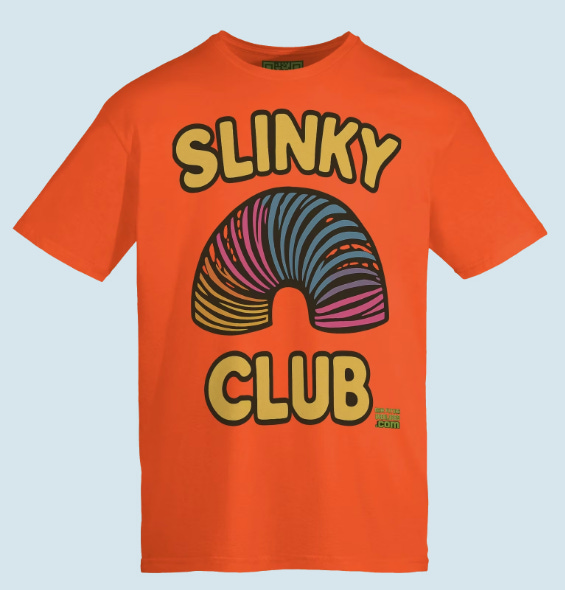

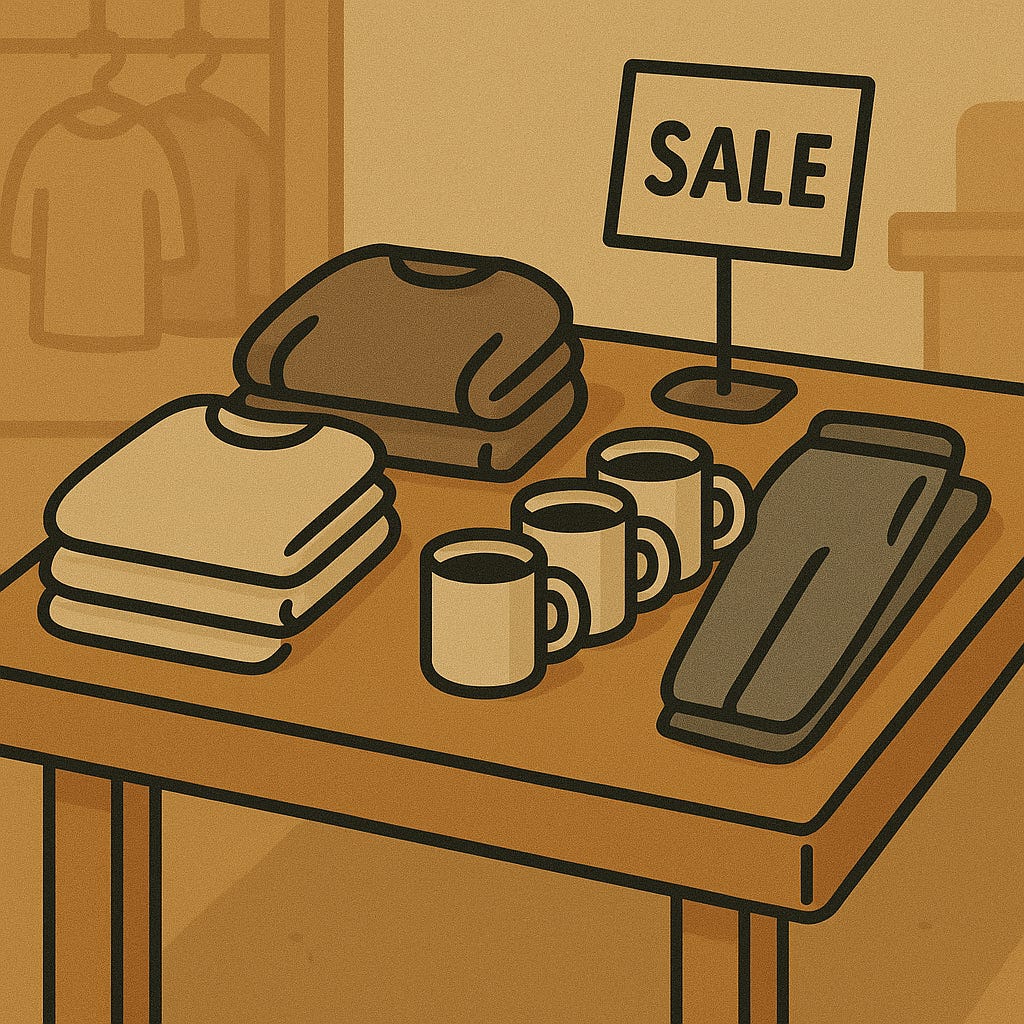
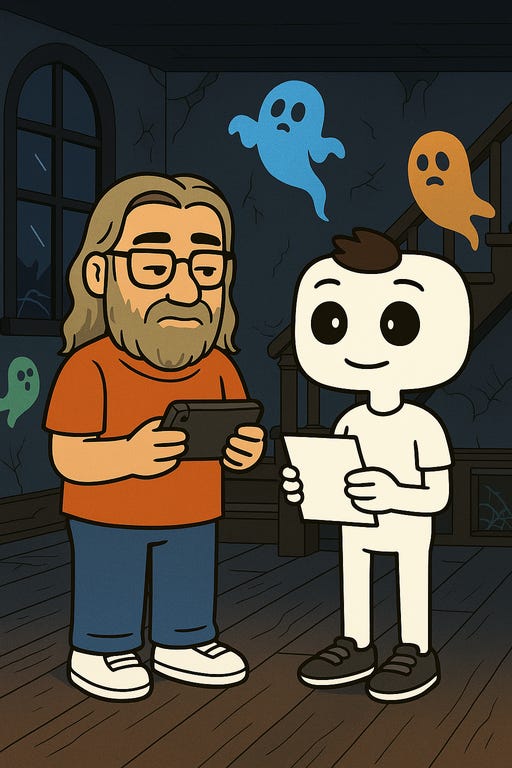
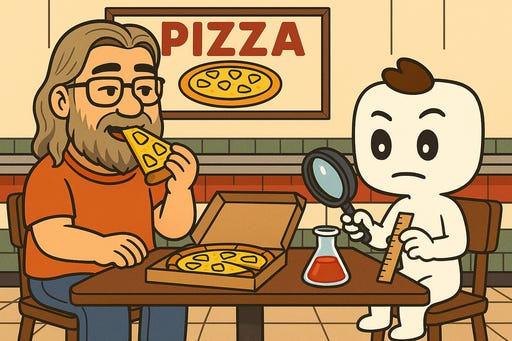
Very digestible wisdom, I have put the Oreos back in the pantry and also checked out the opposite opinion of that which I believed to be true! And was quite pleasantly surprised.🧐😉